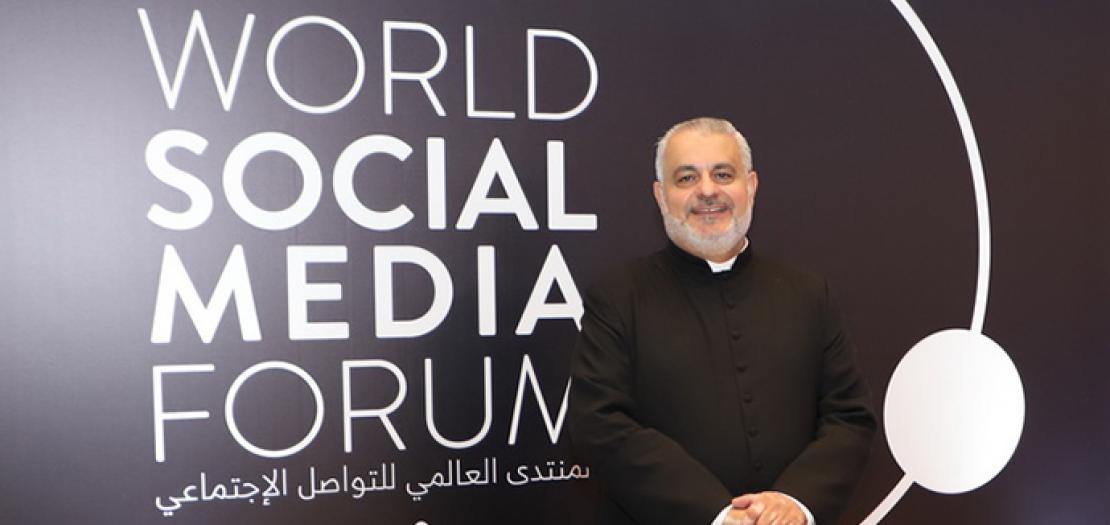Last year, I marked the 25th anniversary of my Latin Patriarchate priestly ordination. This year, specifically on November 26, commemoratives the passage of 25 years of my journalistic writing, particularly in the renowned Jordanian newspaper Al-Rai, where I had my first article published on this very day in 1996 despite the fact that I used occasionally to write articles for “Al-Quds” daily as well as for two magazines, namely Sawt al-Aradh Almuqaddasa (Voice of the Holy Land) and Al-Kalimah (The Word) . Yet writing for Al Rai daily has an outstanding significance.
My first article was titled “Born to Kill,” and it was a comment on an inhuman slogan printed by an Israeli soldier’s military uniform. It was so provocative which urged me to express indignation in writing. This was the start of “my journey “in Al Rai daily. After a quarter of a century I look back, thanking the Almighty God on this interesting, albeit arduous, journey. Journalistic writing is not easy, but it may be part of a person’s “job” or daily vocation. As for me, as a priest who writes articles, it is something that may not seem part of my original message, but at the same time it is neither a meaningless addition, nor a luxury, but rather it is integrative designed to give a look that seems sometimes different form mundane affairs, conditions, ramifications, challenges, viruses, and vaccination doses. Furthermore, it is good to clarify the positive role of religion in world affairs.
Over the past 25 years in my journalistic activities that developed with the launching of “abouna.org websites” and the administration of the Catholic Center for Studies and Media, I neither joined a party, nor was I affiliated with anybody. I was neither attracted to influential people nor to rich people despite my great respect for their roles. Thank God, I remained faithful to my priesthood, my country, my Arab Christianity, my loyalty to my Hashemite leadership, and my belonging to every pebble in this homeland. I was never paid for any article at my request from the first day of having my articles posted in Al Rai daily. The first visit to the offices of Al-Rai daily was in 1996 in the company of writer Hisham Azizat at the time when the editor-in-chief was Suleiman Al-Qudah. Later, I made friends with all the editors-in-chief, namely Abdul Wahab Zaghilalat, George Hawatmeh, Samih Ma’aytah, Majid Asfour, Samir Hiyari, Tariq Momani, Rakan Sa’aydeh and Khaled Shuqran. I also made friends with the editors of articles, especially Abdullah Hijazi–who provided me from the beginning with his honest advice and sound guidance–as well as with Ahmad Husban, Basil Rafay’a, Khalil Shobaki and later with Raddad Qarala. I also visited the successive chairmen of the board of directors. I do not exaggerate in saying that I maintain good relations with everyone including the writers, the editors, the heads of departments, and Al-Rai Center for Studies and the Printing. When I enter Al Rai building, I feel that I am at home. Furthermore, I do not forget the first fax messages that I used to sent from Al Rai office administered by Nabil Ijeilat in Madaba, where I was working.
Since my first article, prior to the technical development relevant to the social media until this moment, I have been trying to show that a person is not born to be killed, but rather to live and to bring life to others. As I write my article on the silver jubilee that regretfully coincides with the third wave of the pandemic in my country and in the world at large, which coincides with the war raging in more than one part of the Earth, I hope that the entire humanity will be completely healed from the corona virus as well as from the hate viruses, so that the Lord would bless people with a new birth that is free from killing and bloodshed while inundating them with love, altruism, courage, freedom and peace.
I learned a lot in the school of Al Rai, which was issued in the year I was born, namely 1971. I wrote about the conditions of people, the role of religion, dialogue, harmony, culture, art, religious tourism, as well as the homeland affairs of the homeland, its pain, its hopes among others.
One of the most important lessons I learned is not to reject an opinion that disagrees or criticizes an idea that I express, to respect the other opinions, as well as to differentiate in my addresses between a sermon that I deliver as a clergyman in the Church and an article I write on the pages of a public newspaper. The essence is one, but the discourse in the newspaper is societal which one gets trained to gradually.
As this anniversary coincides with the centenary of the beloved Jordan, I quote the slogan and say, “The march continues”, journalistic writing is a source of pride, and it is a reflection of the freedom of expression in our beloved kingdom. It is not easy for a priest to write a weekly article in a political daily, yet it has a positive reflection on the homeland that embraces everyone. Despite the fact the newspapers’ role has been weakened, but a comprehensive perspective states that it is not an easy procession yet it is a positive reflection to the spirit of harmony, to the freedom to voice honest views and sagacious “opinion” in and of harmony, namely the country of the Hashemites who guide the ship over a hundred years with nonpareil expertise, know-how and skill.
Fr. Dr. Rif’at Bader






